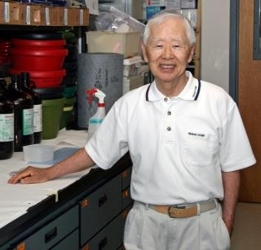

|

|
IN MEMORIAM
Fumio Matsumura
Professor of Environmental Toxicology and Entomology
UC Davis
1934-2012
Fumio Matsumura, 78, a Distinguished Professor of Environmental Toxicology and Entomology at the University of California, Davis, and internationally known as “one of the grand masters of insect toxicology,” died of complications from pneumonia Thursday, December 6, 2012 in a Sacramento hospital following a brief illness.
Dr. Matsumura, a member of the UC Davis faculty since 1987, was founding director of the Center for Environmental Health Sciences, and editor-in-chief of Pesticide Biochemistry and Physiology. He wrote the classic textbook, Toxicology of Insecticides, first published in 1975 and used by generations of university students worldwide. Dr. Matsumura has been at the cutting edge of both pesticide and environmental toxicology, and his pioneering research has helped to define both fields. His legacy will continue through the many students and postdoctoral fellows he has mentored.
Born Feb. 5, 1934 in Japan, Dr. Matsumura received his bachelor’s degree in agricultural biology in 1957 from the University of Tokyo; master’s degree in entomology in 1959 from the University of Alberta; and doctorate in zoology from the University of Western Ontario in 1961. He did postdoctoral work at the University of Wageningen, Netherlands, and Cornell University. In 1964 he joined the faculty of the Department of Entomology at the University of Wisconsin, Madison, where he attained tenure. In 1977 he was appointed director of the Pesticide Research Center at Michigan State University. At UC Davis he served as the Chair of the Department of Environmental Toxicology, associate director of the UC Toxic Substances Program Research and Teaching Program, director of the NIEHS-supported Center for Environmental Health Sciences and was among the first faculty in the NIEHS-funded Superfund Basic Research Program. He was also a founding member of the NIH Comprehensive Cancer Center at UC Davis, and helped write the original proposal for the center.
His prolific research programs involved the environmental toxicology of pesticides and dioxin-type chemicals; microbial degradation of toxicants; insect toxicology; and extensive studies of biologically active substances, oncogenes, and protein kinases. He contributed seminal knowledge in the biochemical and molecular mechanisms of action of tetrachlorodibenzo-p-dioxin (TCDD) and of the estrogenicity of DDT analogs, fungal metabolism of pentachlorophenol (PCP) and in epidemiological approaches to the study of the health effects of dioxins among Vietnam War veterans.
A colleague described him as “so much fun and so stimulating. Each day he made the world a brighter and more interesting place with his enthusiasm over science, teaching, and pleasure of life.” Another noted how fortunate we were to be able to attract Dr. Matsumura from Michigan State. “He brought spirit, energy, and knowledge that has been essential to our faculty and students in the pursuit of excellence in environmental health sciences.”
He had incredibly broad interests, ranging across a variety of scientific areas to skiing, hiking, golfing, fishing, and hunting. His skiing talents were honed while a graduate student at the University of Alberta where he participated in ski jumping at a pre-Olympic collegiate ski meet at Squaw Valley. His weekend ski trips invariably included a complement of graduate students, visiting scientists and colleagues, with impromptu discussions of hot issues in research interspersed with the exhilaration of runs down the mountain.
Dr. Matsumura began each day playing the piano and Chopin was a favorite. He was accomplished in oil painting of outdoor scenery. He approached each activity with full energy and a goal of being the best, echoed in his frequent exhortations to his research team to muster the talent and energy to be the first across the finish line - one of several of his favorite sports analogies.
His professional achievements were similarly broad. He served as director of the IR-4 Leader Laboratory, which facilitates pesticide registrations nationally for specialty crops, while Director of the Pesticide Research Center at Michigan State University and later at Davis. He was a member of the American Chemical Society, Society of Toxicology, and a founding member of the Society for Environmental Toxicology and Chemistry. His graduate level courses, on environmental toxicants and ecotoxicology, were required for graduate students in several programs but almost certainly would have been filled with students appreciative of Dr. Matsumura’s insights, ingenuity and wit.
Dr. Matsumura received numerous prestigious awards acknowledging his scientific accomplishments and contributions. He received the Burdick-Jackson International Award from the ACS Division of Agrochemicals in 1988 and delivered the 20th annual Paul A. Dahm Memorial Lecture in 2011 at Iowa State University. He received the Distinguished Scientist Award (College of Natural Sciences, Michigan State University, 1984); Eminent Scientist Award (Riken Institute, Japan, 1995); Achievement Recognition Award in 1995, Lifetime Contribution Recognition Award in 2001, and the Mochizuki Prize on Chemical Safety in 2001, all from the Society of Pesticide Science. ACS’s Agrochemical Division and the IUPAC International Congress of Pesticide Chemistry plan a tribute at the ACS-IUPAC meetings in San Francisco in 2014.
Dr. Matsumura is survived by his wife, Teruko, of Davis, and sons, Ichiro and Miko. The family has established a memorial fund in his honor through the UC Davis Foundation. http://www.fumiomatsumura.com/?page_id=44 or https://awc.ucdavis.edu/MakeAGift.aspx?alloccat=130217120
James Seiber
Michael Denison
Bruce Hammock